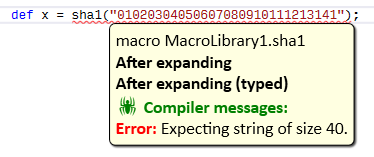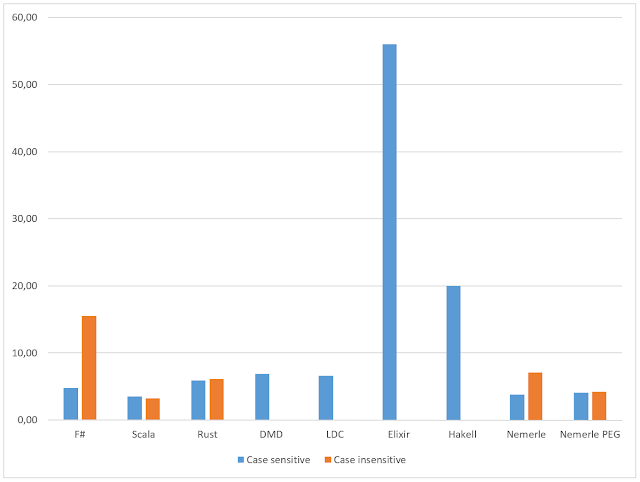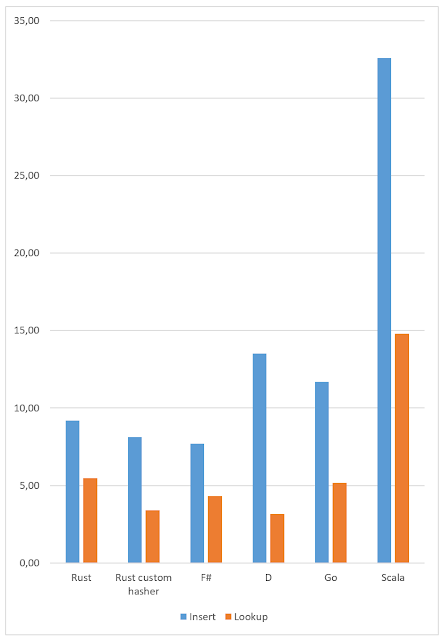SHA1 compile time checked literals: F# vs Nemerle vs D
I've always been interested in metaprogramming. Sooner or later, I'm starting to feel constrained within a language without it. F# is a really nice language, but I'm afraid I'd have got bored with it if it'd not have Type Providers, for example. Why metaprogramming is so important? Because it allows changing a language without cracking the compiler. It allows making things which seemed to be impossible to implement.
I'm dealing with cryptography hashes a lot at work, nothing rocket since, just MD5, SHA-1 and so on. And I write tons of tests where such hashes are used in form of string literals, like this:
The problem with this code is that the compiler cannot guarantee that the hex string in the last line represents a valid SHA-1. If it does not, the test will fail at runtime for a reason it's not intended to.
OK, now we can formulate our task: provide a language construct to enforce a string literal being a valid SHA-1 hexadecimal, at compile time. We will explore how much work it's required to implement such a simple feature in F#, Nemerle and D. It's also interesting how well the development workflow is for each of this languages - IDE integration, error reporting and testing cycle.
Using Type Providers is the only way to check (at compile time) that a string is a valid hex one and that it's length is exactly 40 characters (SHA-1 is a 20-bytes hash). Actually, I've written this type provider before. The interesting part looks like this:
It includes caching, and `HexParser` module is not shown, but those details are not important here. It's simple and it generates Value property which directly returns byte array, created in compile-time.I'm dealing with cryptography hashes a lot at work, nothing rocket since, just MD5, SHA-1 and so on. And I write tons of tests where such hashes are used in form of string literals, like this:
The problem with this code is that the compiler cannot guarantee that the hex string in the last line represents a valid SHA-1. If it does not, the test will fail at runtime for a reason it's not intended to.
OK, now we can formulate our task: provide a language construct to enforce a string literal being a valid SHA-1 hexadecimal, at compile time. We will explore how much work it's required to implement such a simple feature in F#, Nemerle and D. It's also interesting how well the development workflow is for each of this languages - IDE integration, error reporting and testing cycle.
F#
Error reporting:
Nemerle
Nemerle has full fledged macros, which strictly more powerful than F#'s Type Providers. Let's see if they allow solving the task in an elegant way:Error reporting:
D
The code does not use any unusual stuff and does not manipulate AST. Just plane D code. Very elegant. Note that the template is defined in the same file as its usage. Contrast this with F# and Nemerle where you have to place your Type Provider / macros into a dedicated assembly.
Error reporting:
The error is located in the template itself, not at the instantiation point though.
Performance
I added 1000 usages of the TP, macro and template and measured compilation time.- F# - 5 seconds
- Nemerle - 2 seconds
- D - the compiler crashes with "Error: out of memory" after 1 minute work.








Comments
* D: clearest solution, looks just usual code but runs in compile time, wow!
* Nemerle: more verbose, but still readable and understandable. ~30 lines of almost buisness logic code + some syntatic garbage (curly braces, etc)
* F#: a 25 lines of low-level magic and this is without buisness logic, only TP-related stuff (in contrast to Nemerle and D)
Macroses really interesting topic.